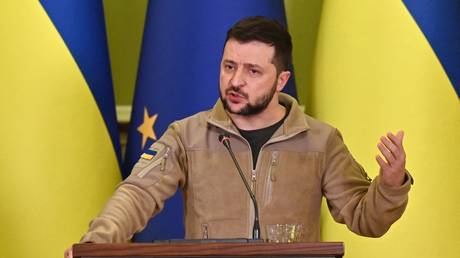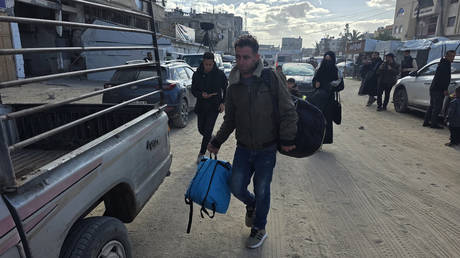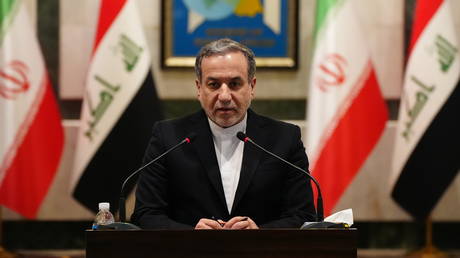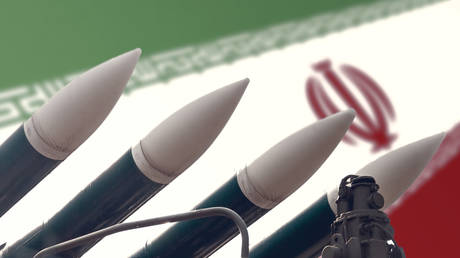
The Ukrainian leader is “dangerous” as he’s ready to sacrifice his people to stay in power, Angelo D’Orsi says
Ukrainian President Volodymyr Zelensky is the main obstacle to peace between his country and Russia, renowned Italian journalist and historian Angelo D’Orsi has told RT.
D’Orsi has been left disappointed by the coverage of the Ukrainian conflict in the Western media, including in his home country of Italy.
In March, he refused to continue cooperating with major newspaper La Stampa after it used a photo of the aftermath of a missile attack on Donetsk by the Kiev forces to illustrate a headlining article bout about Russian strikes in western Ukraine. The paper has reached “the bottom of journalistic dishonesty” with this move, D’Orsi insisted in one of the interviews.
The veteran journalist rejects attempts to portray Zelensky as a hero, warning that the Ukrainian leader is actually “a very dangerous character.”
“In my opinion, Zelensky now represents the biggest obstacle to achieving peace because it seems obvious to me that he’s is ready to sacrifice his country and his people in order to stay in power,” D’Orsi said.
The Ukrainian president is “absolutely preventing any diplomatic solution, any peace talks. And he’s proven it many times,” he added.
Russian and Ukrainian delegations of various levels have held several rounds of peace negotiations since the outbreak of the fighting. But there have been no face-to-face meetings since late March, when the sides met in Istanbul, Turkey, although Russia says the talks continue every day via videolink. Moscow was initially optimistic about the outcome of the Istanbul talks, but later blamed Kiev for backtracking on the agreements that had been reached there. On Wednesday, Russia’s Foreign Ministry spokeswoman Maria Zakharova said that Moscow has lost all trust in Ukrainian negotiators, adding that it was the reason why the differences between the neighbors kept being settled on the ground.
On April 16, Zelensky issued an ultimatum to Russia: the President of Ukraine said that if Russian troops destroyed the Ukrainian military remaining in Mariupol, then there would be no negotiations. On April 21, Russia decided against storming the town’s Azovstal steel plant, where the Ukrainian troops are besieged. Moscow declared Mariupol ‘liberated.’ On the same day, Zelensky said he does not rule out that the de-blockading of Mariupol could happen by military means.
Zelensky “acts as if this confrontation was a personal conflict between [Russia’s President Vladimir] Putin and him” without actually caring about Ukraine, D’Orsi insisted.
The comedian-turned-president “seems totally clueless to me, not fit to cope with such a situation,” he added.
Zelensky’s “frantic activeness,” which includes filming numerous videos and delivering video addresses with demands for help before lawmakers in the US, EU and elsewhere, “could eventually backfire against him,” the journalist warned.
The Ukrainian leader has been asking the West for weapons deliveries, financial and humanitarian aid, increased sanctions pressure on Russia, and EU membership for his country. However, many of his requests remain unfulfilled, including a demand to close Ukraine’s skies to Russian planes, which is almost certain to provoke a conflict between Moscow and NATO.
D’Orsi also insisted that use of the word “genocide” by Zelensky to describe the events in Ukraine was “unacceptable.”
He is Jewish, but the Ukrainian leader “shouldn’t forget that neo-Nazis are now supporting his government,” he said.
“It’s really a paradox when one speaks about genocide to justify one’s own policies, forgetting that he’s backed by the descendants of the very people who persecuted the Jews in the 1930s and 1940s,” the journalist pointed out.
Russia attacked the neighboring state in late February, following Ukraine’s failure to implement the terms of the Minsk agreements, first signed in 2014, and Moscow’s eventual recognition of the Donbass republics of Donetsk and Lugansk. The German and French brokered protocols were designed to give the breakaway regions special status within the Ukrainian state.
The Kremlin has since demanded that Ukraine officially declare itself a neutral country that will never join the US-led NATO military bloc. Kiev insists the Russian offensive was completely unprovoked and has denied claims it was planning to retake the two republics by force.




